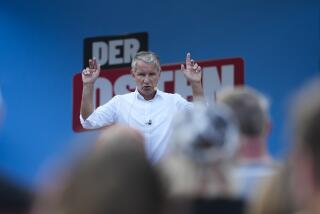Long-Simmering Ethnic Concerns Burst Forth in New Soviet Elections
- Share via
VILNIUS, Soviet Union — In the most fiercely fought contests of the Soviet Union’s current parliamentary election campaign, candidates of a strongly nationalist movement appear likely to defeat the official Communist Party slate here in the Baltic republic of Lithuania.
The Lithuanian Reform Movement is predicting that its candidates will win at least 30 of the 42 seats at stake here in the elections next Sunday for the Soviet Union’s new Congress of People’s Deputies. Even party officials do not quarrel much with that projection.
“The people are getting in these elections a chance to say who they are, what they stand for and what they want for themselves, their families and their country,” says Virgilijus Cepaitis, general secretary of Sajudis, as the Reform Movement is called. “Although we do not think these elections will be so perfect, we believe their results will be quite clear.”
But such a dramatic outcome--a Communist Party defeat in the first contested national elections since the earliest years of the Soviet state--does not dismay Algirdas Brazauskas, first secretary of the Lithuanian Communist Party, despite its far-reaching implications.
“Sajudis will get quite a few electoral mandates, even a majority--that is clear,” Brazauskas said recently in an interview. “But if Sajudis ‘wins,’ to use that term, it will be no tragedy--far from it, because most of its candidates are Communists themselves, members of our party as well as supporters of Sajudis.
Forced Incorporation
The electoral campaign has brought into sharp focus many difficult issues, foremost among them Lithuania’s forced incorporation into the Soviet Union in 1940 under the dictator Josef Stalin and the widespread demand now for restoration of sovereignty.
“The years of Stalinism left a very bad foundation for understanding what our future as a nation is,” Vasily Emelyanov, editor of the Russian-language newspaper Sovetskaya Litva and a party candidate in the elections, said. “We would like to go forward--there is so much to do--but we are finding that difficult until we clear up the past. . . .
“Although we have a stronger vision of the future (than Sajudis has) and a program that will bring us real sovereignty within the Soviet Union, we often find ourselves on the defensive and dealing with the past.”
The party also faces an even grimmer prospect: the possible capture by the nationalist movement of enough seats in the Lithuanian legislature in future regional elections to enable it to control the republican government here.
Test of Confidence
Many would take such a result as meaning that the party had lost the confidence of the people and had been voted out in free and fair elections it had organized itself.
“There might be such a development,” Brazauskas said of a Sajudis victory in republican elections, “but I rely on the common sense of our Lithuanian people. And if good men were elected on a Sajudis platform, that is what would matter. . . . “
Before the current elections were called, nationalism was already on the upsurge--from the Baltic republics of Estonia, Latvia and Lithuania through Byelorussia, the Ukraine and Moldavia, down to Armenia, Azerbaijan and Georgia and across much of Central Asia--as President Mikhail S. Gorbachev’s political liberalization and economic reforms brought long-suppressed feelings into the open.
“Ethnic nationalism varies only in its intensity because it is present everywhere,” social scientist Boris Grushin said. “Although the degree of radicalism is sometimes alarming, especially in the Baltic republics and also in Armenia and Azerbaijan, where blood has been shed, we have to regard these sentiments as more or less normal after we failed to deal with them for so long. . . .”
Indeed, all the long-festering issues--past persecutions, national culture and language, policies of Russification and environmental protection--have burst into the campaign.
“Everyone in our region is running as a nationalist, even the most slavish Russophile,” a young Ukrainian activist from Lvov, in the western Ukraine, said during a visit here. “We have party people who have not spoken Ukrainian regularly for 15 or 20 years making the funniest speeches in Ukrainian, because they know that no one will listen to a word of Russian. At the very least, we will finally get Ukrainian made our state language out of this election.”
Even the continuing crackdown on nationalism in Armenia and Azerbaijan has not prevented opposition candidates from mounting strong campaigns.
“We no longer can get 100,000 or 200,000 people together in the city center,” a nationalist organizer said by telephone from Yerevan, the Armenian capital. “But every night we do gather hundreds of people at more than 20 election meetings. . . . And so our struggle continues by different means.”
Ronald Grigor Suny, a University of Michigan specialist on Soviet nationality issues, said last week in Moscow that the elections were the preferred, almost ideal outlet for the growing ethnic tensions.
“Elections can channel into a political forum the rising radical nationalism which can otherwise prove quite explosive,” Suny said. “But the election process must be more than a safety valve releasing pressure. It has to translate the dynamics of nationalism to the new constitutional system with the credible promise that problems can be solved there. . . .”
Baltic activists are undoubtedly the best organized and most politically sophisticated of the new nationalist movements. And like Sajudis in Lithuania, the Estonian Popular Front and the Latvian Popular Front are using the election campaign to push their demands for greater political, economic and cultural autonomy and to challenge further the party’s long monopoly on power.
The Lithuanian campaign, as a result, has become one of great emotion, with assertions from some Sajudis candidates of a right to secede from the Soviet Union and counter-demands from the rival, predominantly Russian, Unity movement for the republic’s clear subordination to Moscow.
On almost every public question now there is a party view, a Sajudis view, often a Unity view and perhaps a “Green” view put forward by environmental activists.
The Lithuanian Communist Party has responded to this political proliferation with a boldness that has made it one of the most progressive in the Soviet Union in recent months, and this has kept its leadership in trouble with party headquarters in Moscow.
“As a governing party, we are responsible for the destinies of the people,” said Brazauskas, the first secretary of the party. “We have a program for achieving real sovereignty for our Lithuania. We have formulated this in a draft constitution, most of which Sajudis agrees with, and we have taken major steps toward this goal.
“But we have also had to say a few tough words to remind people that there are limits beyond which we cannot go.”
Sajudis’ call for Lithuanian sovereignty, now the core of its political program, is not meant as a return to the same independent status the country had prior to its annexation, Sajudis Chairman Vytautis Landsbergis said. What the movement is really pushing for, he said, is radical reform of the whole Soviet Union, and of Eastern Europe as well, believing that Lithuania will benefit most from this.
More to Read
Sign up for Essential California
The most important California stories and recommendations in your inbox every morning.
You may occasionally receive promotional content from the Los Angeles Times.













